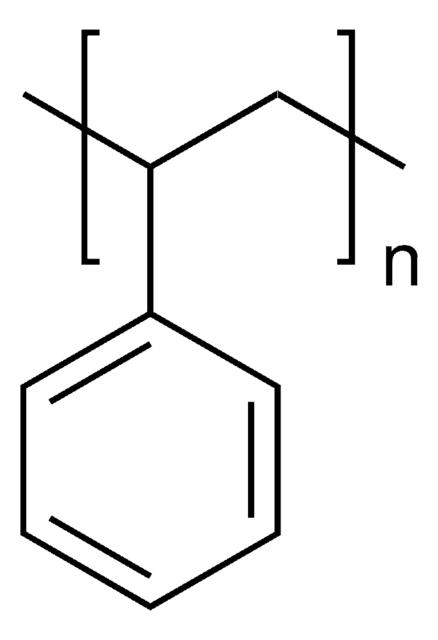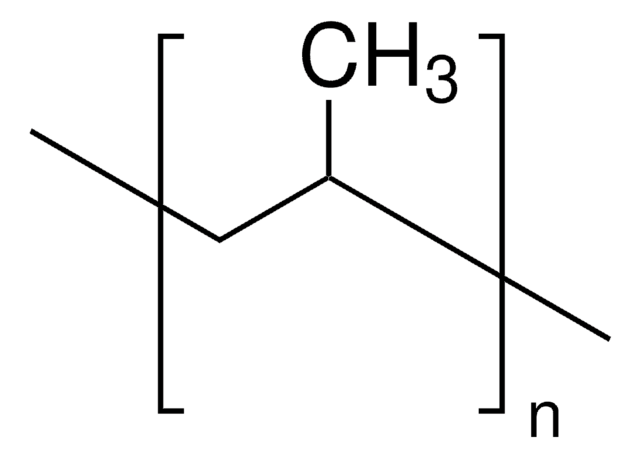450383
Polystyrene
average Mw ~400,000 by GPC
Synonym(s):
PS
Sign Into View Organizational & Contract Pricing
All Photos(1)
About This Item
Linear Formula:
[CH2CH(C6H5)]n
CAS Number:
MDL number:
UNSPSC Code:
12162002
PubChem Substance ID:
NACRES:
NA.23
Recommended Products
form
powder
Quality Level
mol wt
average Mw ~400,000 by GPC
mp
212 °C
SMILES string
c1(ccccc1)C=C
InChI
1S/C8H8/c1-2-8-6-4-3-5-7-8/h2-7H,1H2
InChI key
PPBRXRYQALVLMV-UHFFFAOYSA-N
Looking for similar products? Visit Product Comparison Guide
Related Categories
Application
- Applications of Polystyrene in Industrial Chemistry: This comprehensive review discusses the synthesis, characteristics, and wide-ranging applications of polystyrene, emphasizing its role in academic research and industrial usage (T Arfin et al., 2015).
- Upcycling Polystyrene: This article explores innovative approaches to recycling polystyrene, reducing environmental impact and advancing sustainability in material sciences (JC Capricho et al., 2022).
- Potential Toxicity of Polystyrene Microplastic Particles: Examines the potential impacts of polystyrene microplastics on human health at the cellular level, important for public health and safety (J Hwang et al., 2020).
Physical form
90% isotactic.
Storage Class Code
11 - Combustible Solids
WGK
WGK 3
Flash Point(F)
Not applicable
Flash Point(C)
Not applicable
Personal Protective Equipment
dust mask type N95 (US), Eyeshields, Gloves
Choose from one of the most recent versions:
Already Own This Product?
Find documentation for the products that you have recently purchased in the Document Library.
Customers Also Viewed
Prasert Akkaramongkolporn et al.
AAPS PharmSciTech, 10(2), 641-648 (2009-05-20)
The differently sulfonated styrene-divinylbenzene cross-linked copolymer cationic exchange resins were prepared by oil-in-water polymerization and varied degrees of sulfonation. Several characteristics of the obtained resins were evaluated, i.e., Fourier transform infrared spectra, the ion-exchange capacity, microscopic morphology, size, and swelling.
Hui Xia et al.
Journal of colloid and interface science, 376(1), 322-326 (2012-03-27)
The aggregation kinetics of particles in dense polystyrene latex suspensions is studied by low-coherence fiber optic dynamic light scattering. Low-coherence fiber optic dynamic light scattering is used to measure the hydrodynamic radius of the aggregates. The aggregation kinetics data obtained
Liang Zhang et al.
Journal of colloid and interface science, 353(2), 557-561 (2010-10-30)
Reported are adsorption isotherms for guar and hydroxypropyl guar (HPG), with and without the presence of borate ions, onto surfactant free anionic polystyrene latex. Guar and HPG formed adsorbed monolayers on the hydrophobic latex. The presence of borate ions converted
Katherine Sarlo et al.
Toxicology, 263(2-3), 117-126 (2009-07-21)
Understanding tissue distribution and clearance of nanomaterials following different routes of exposure is needed for risk assessment. F344 female rats received single or multiple exposures to 20 nm, 100 nm or 1000 nm latex fluorospheres by intravenous (i.v.) injection or
Di Wei et al.
ACS nano, 2(12), 2526-2530 (2009-02-12)
We have fabricated single-walled carbon nanotube (SWNT) field effect transistors (FETs) with molybdenum source and drain contacts. Normally, these devices operate only as p-channel transistors, however, after polystyrene latex nanospheres were attached to the nanotubes close to the contacts, they
Articles
Universal Platform for Surface Modification Employing Grafted Polymer Layers
Our team of scientists has experience in all areas of research including Life Science, Material Science, Chemical Synthesis, Chromatography, Analytical and many others.
Contact Technical Service



